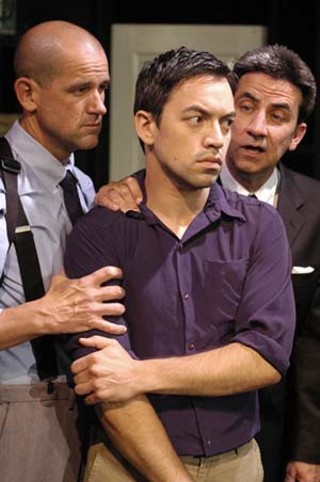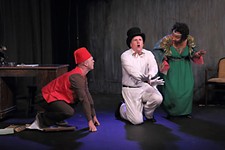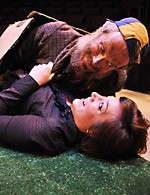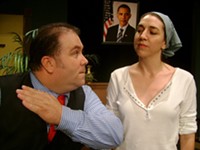The Pillowman
Hyde Park Theatre has mounted an excellent production of The Pillowman, Martin McDonagh's immensely challenging tale of gruesome crimes, accountability, and storytelling
Reviewed by Hannah Kenah, Fri., June 22, 2007

The Pillowman
Hyde Park Theatre, through July 7
Running time: 2 hr, 45 min
"The first duty of a storyteller is to tell a story. …
Or is it the only duty of a storyteller is to tell a story?"
Hyde Park Theatre has mounted an excellent production of an immensely challenging and strikingly brilliant play. Martin McDonagh's The Pillowman is a tale of gruesome crimes, accountability, and storytelling in which its dark mind twists around itself. McDonagh is a master of language and of surprise, and in this play he tells no fewer than eight stories within the framework of the larger story and includes nearly as many revelations. This play would be painful if not handled properly. Fortunately, Ken Webster and his cast and crew are equal to the task.
The Pillowman's main character is a writer named Katurian Katurian, whose sick short stories have come to life – a little girl dies from eating razor blades; a boy bleeds to death after his toes are sliced off – so Katurian and his brain-damaged brother are hauled into the police station for interrogation. To describe this play is to make it sound horrifying. It is not. It is fascinating. McDonagh uses Katurian's writing as a filter through which to analyze its own origin and impact. Who is responsible for the murder of a child? The man who deals the final blow or the man who creates the story that describes the final blow? Each story is spun in a different manner, creating a kaleidoscopic effect. A cop gruffly summarizes "The Three Gibbet Crossroads." The writer lovingly reads "The Tale of the Town on the River." There is a stylized presentation of "The Little Jesus." And the title story, "The Pillowman," becomes a twisted bedtime story shared between brothers.
HPT's production honors McDonagh's ingenuity, using the space in as many ways as the stories are told. Paul Davis' set design and Don Day's lighting design transform Hyde Park Theatre into a gritty, stark room in a totalitarian dictatorship. Then in a heartbeat, it becomes a little boy's bedroom in a nightmarish fairy tale. Jude Hickey is phenomenal in the lead role; his Katurian is a proud artist, a distraught brother, an innocent, a criminal. He tenderly cares for the words he is given, and he listens beautifully to the other characters as they tear apart the world around him. Mark Pickell takes on the toughest role, that of Katurian's brain-damaged brother, Michal. Pickell's performance runs toward the sweetness one associates with Down syndrome. However, this character was not born with a cognitive impairment; it was inflicted upon him by years of torture. The character maintains a level of conversation and comprehension that is surprising and at times disturbing. Pickell's performance doesn't quite match the scripted character, but it is a relief all the same. Ken Webster, the good cop, and Kenneth Wayne Bradley, the bad cop, do handy work with their roles. Bradley does a lovely job playing the wildly angry and ultimately sympathetic Officer Ariel. The play's best scene comes after intermission when Webster's character, Detective Tupolski, tells Katurian a story that he once wrote: "The Story of the Little Deaf Boy on the Big Long Railroad Tracks. In China." Tupolski proclaims this story to be better than all 400 that Katurian wrote. Hickey's confusion and Webster's defensiveness make this scene priceless.
The Pillowman presents a cruel world. Tupolski says: "I don't have a worldview. I think the world's a pile of shit." Yet there are glimmers of joy as the writer shares his stories. The creativity is a threat. Tupolski says, "We like executing writers. It sends a signal." Katurian claims that he and his stories are innocent. "I don't have themes. … I'm not trying to say anything at all." But over the course of the play, we observe a man who puts his fiction above all else, including human life. Few plays can make one actually gasp out loud in astonishment. McDonagh's work manages it every time. These eight stories knit themselves together into one engrossing tale, accomplishing the storyteller's first duty. Or is it his only duty? Free of responsibility and consequence? In Hyde Park Theatre's The Pillowman, a story is told and told well.










